Episodes
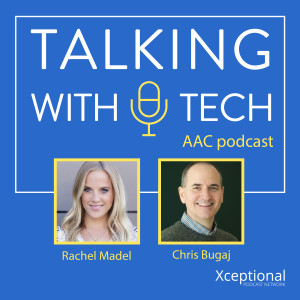
Wednesday Apr 08, 2020
Wednesday Apr 08, 2020
This week, the TWT team presents Rachel’s pre-conference presentation for AAC in the Cloud on AAC and telepractice! This session is filled with practical solutions for practitioners who are working with anyone over telepractice, with an emphasis on working with AAC users.
Key ideas this week:
🔑 All children are candidates for telepractice, but telepractice will look different for everyone. They don’t have to be able to watch a screen for us to facilitate communication!
🔑 Checking in with parent’s to gauge how overwhelmed they are is critical right now; some parents are ready to take on more responsibilities, while other parents may need something simple and achievable.
🔑 Communication should not feel like work - look for the opportunities that already happen during the day and take advantage of them. What is their favorite time of day to spend with their child? When does their child communicate spontaneously, and what do they say?
🔑 Include a variety of communication partners, including siblings, friends, ABA professionals, teachers, etc. You can have them join in virtually as well as in person.
🔑 You can plan ahead and track progress using a shared google sheet to provide materials prior o the session, share photos/videos, and provide feedback after the session.
🔑 Use strengths-based coaching - start with what communication partners are already doing well, build a strong relationship through collaboration & listening, provide performance feedback, and encourage self-reflection.
Links:
Handout from the presentation: bit.ly/teleAAChandout
Free Coaching Guide: www.rachelmadel.com/aaccoach
Rachel’s Free Communication App List: www.rachelmadel.com/applist
Help us develop new content and keep the podcast going strong! Support our podcast at patreon.com/talkingwithtech!
Visit bit.ly/twtpod for access to previous episodes, resources, and CEU credits that you can earn for listening to TWT episodes!
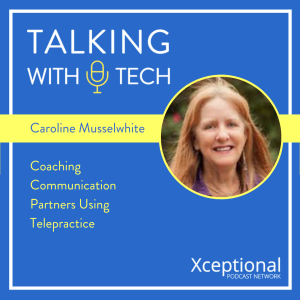
Wednesday Apr 01, 2020
Wednesday Apr 01, 2020
This week, the TWT team is proud to present the amazing Caroline Musselwhite! Caroline shares from her 45 years of experience with low- and high-tech AAC, including the communication circle of people around an AAC user, the importance of pranks & humor when using AAC, recognizing gestures, and more.
Before the interview, Rachel shares from her webinar on telepractice and AAC and why “all children are good candidates for telepractice.” Rachel notes that telepractice can look different for different students, but all children can benefit from a qualified speech-language pathologist and/or AAC specialist facilitating communication, even if students won’t pay attention to the screen. Telepractice doesn’t have to be a direct service model - we can always coach communication partners, including parents, siblings, and other family members on how to support an AAC user's communication.
Key ideas this week:
🔑 Coaching an AAC user’s circle of support should include peers whenever possible. Training friends and siblings allows for exposure to different communication functions, and involving peers can increase an AAC user's motivation and buy-in.
🔑 “Coaching” is not necessarily the same thing as “consulting.” They are both important, but coaching can be more valuable because it involves follow up and showing communication partners how to work with AAC users, not just telling them what to do.
🔑 Gestures are an important part of multi-modal communication. Recognizing what each AAC user communicates (or can communicate) with things like facial expressions can add to the overall effectiveness of their communication.
You can learn more about Caroline and her work at www.aacintervention.com, her AAC Girls blog, on Pinterest, and Teachers Pay Teachers.
Help us develop new content and keep the podcast going strong! Support our podcast at patreon.com/talkingwithtech!
Visit bit.ly/twtpod for access to previous episodes, resources, and CEU credits that you can earn for listening to TWT episodes!

Wednesday Mar 25, 2020
Wednesday Mar 25, 2020
This week, the TWT team presents the audio recording of Chris and Rachel’s AAC Hour-by-Hour webinar originally presented on Xceptionaled.com! This episode is jam packed with practical strategies and advice for parents and professionals working with AAC users who are staying at home. These ideas can be implemented in the home or shared with parents and communication partners via teletherapy!
Key ideas this week:
🔑 Look at your daily schedule and plan out the “when what who and how” for incorporating core words into your routines. Choose routines that happen every day to allow for more chances to model.
🔑 It’s OK to take a break and not model 24/7, especially when you are with an AAC user all day long. When giving AAC users a break, you can let them “babble” and explore with the words on their device freely.
🔑 Have a family meeting and create a to-do list for your extended time at home. Create the to-do list together to increase everyone’s motivation, and give everyone a chance to talk about feelings regarding the break.
For links to the slides used in this episode, including shared resources, go to bit.ly/aachourbyhour
Help us develop new content and keep the podcast going strong! Support our podcast at patreon.com/talkingwithtech!
Visit bit.ly/twtpod for access to previous episodes, resources, and CEU credits that you can earn for listening to TWT episodes!

Wednesday Mar 18, 2020
Wednesday Mar 18, 2020
This week, the TWT team presents Chris's interview with Dr. Elena Dukhovny, professor at CSU East Bay! She is a leading researcher on motor planning, AAC training for paraeducators, and more, and she shares some of what she has learned about these two important topics!
Before the interview, Rachel shares a wealth of useful advice on preparing to consult with parents and the circle of support, including 1) asking what gets kids excited to communicate; 2) having parents write down all non-verbal communication, including behaviors; and 3) asking what parents would change about the child’s communication, if they could. Rachel also shares about gently approaching situations where a non-robust language system was already recommended to parents and she wants a robust language system implemented instead.
Key ideas this week:
🔑 Developing a motor plan allows AAC users to have a rate of speech that is closest to verbal speech.
🔑 Elena’s research indicates fluent AAC device users plan and remember words by where their hands move on the device, similar to how speaking people remember words by how they sound and sign-language users remember words by how they are signed.
🔑 Briefly trialing different language systems isn’t always the best way to determine what system will be best for a user in the long term. For example, a system that is simpler or easier to visually scan may be learned quickly, but if motor planning isn’t supported then a user may not become as fluent with that system long term.
Help us develop new content and keep the podcast going strong! Support our podcast at patreon.com/talkingwithtech!
Visit bit.ly/twtpod for access to previous episodes, resources, and CEU credits that you can earn for listening to TWT episodes!
Research
Dukhovny, E., Gahl, S. (2014) Manual motor-plan similarity affects lexical recall on a speech- generating device: Implications for AAC users. Journal of Communication Disorders 48, 52-60.
Thistle, J. J., Holmes, S. A., Horn, M. M., & Reum, A. M. (2018). Consistent symbol location affects motor learning in preschoolers without disabilities: Implications for designing augmentative and alternative communication displays. American journal of speech-language pathology, 27(3), 1010-1017.
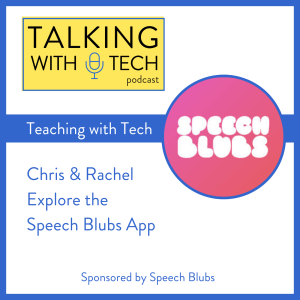
Monday Mar 16, 2020
Monday Mar 16, 2020
Speech Blubs will be giving away a lifetime membership to anyone who signs up to become a Talking with Tech Patreon member by April 2nd, 2020! Just go to patreon.com/talkingwithtech!
In this episode of Teaching with Tech, Chris and Rachel dive into the Speech Blubs speech therapy app. The Speech Blubs app utilizes games, video/peer modeling, and augmented reality to make learning language and improving speech skills fun and engaging! You can use the app to teach emotions & core words, work on wh- questions, improve verbal speech, and more. The app has been used successfully to improve communication for children with speech delay, Autism Spectrum Disorder, Down syndrome, and apraxia!
You can download a free trial of the app by going to speechblubs.com.
Find out more about Speech Blubs on Instagram (@speechblubs) or by emailing them at hi@blubblub.org

Wednesday Mar 11, 2020
Wednesday Mar 11, 2020
This week on TWT, Chris interviews Christine Tripoli, an SLP with the Deaf/Blind program at Perkins School for the Blind, and Ellen Maisel, Director of Cortical Visual Impairment project at Perkins. They discuss cortical visual impairment (CVI), including what it is and how to look for it.
Before the interview, Chris shares about his discussion on AAC Certification with Marie Ireland, VP of ASHA. Chris wonders if a slippery slope argument (if we let A happen, then Z will happen) is happening with AAC certification and talks about yourlogicalfallacy.com. Marie talked with Chris about the lack of data to support anyone getting denied services once a certification is put in place.
Key ideas this week:
🔑 CVI is a brain-based visual impairment that affects visual attention and recognition. The cause of visual impairment for people with CVI isn’t their eyes, but their visual brain.
🔑 Just because a child is looking at something, doesn’t mean they understand what they are seeing. This understanding is the primary challenge for children with CVI.
🔑 For brain-based visual impairment, you don’t need to just make it bigger or closer. Its about teaching them to understand what they are looking at.
If you love Talking with Tech, help us develop new content and keep the podcast going! Support our podcast at patreon.com/talkingwithtech!
Visit bit.ly/twtpod for access to previous episodes, resources, and CEU credits that you can earn for listening to TWT episodes!

Thursday Mar 05, 2020
Thursday Mar 05, 2020
This week, the TWT team presents Chris’s roundtable discussion on coding, robots, and AAC with Darla Ashton, Brian Franklin, Catherine Brown, Kelly Fonner. They discuss practical strategies for teaching language using the Dash robot, Ozobot, Code.org, the Every Move Counts method, and more!
Before the roundtable, Rachel and Chris share about meeting each other for the first time in PA during the previous winter break. Rachel also describes going to a screening of Uncut Gems and meeting Adam Sandler! Finally, Rachel and Chris talk about the challenges and rewards of networking, and how they have both become more comfortable with criticism!
Key ideas this week:
🔑 It is important to be ourselves when interacting with others, especially when networking. While not everyone will be interested in us when we are ourselves, the connections we do make are stronger when we are authentic!
🔑 Coding and working with robots is a great way to work on core vocabulary (e.g. “go here”)
Robots can be more age appropriate for students in school, especially middle and high school
🔑 Coding can encourage peer interaction, because coding robots is motivating to many students, and it allows robotics teams and students in special education to work side by side.
If you love Talking with Tech, help us develop new content and keep the podcast going! Support our podcast at patreon.com/talkingwithtech!
Visit bit.ly/twtpod for access to previous episodes, resources, and CEU credits that you can earn for listening to TWT episodes!
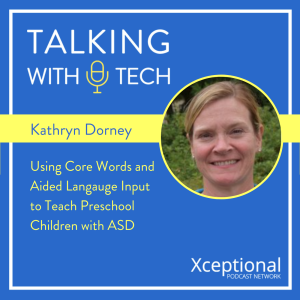
Wednesday Feb 26, 2020
Wednesday Feb 26, 2020
This week, TWT presents Rachel’s interview with Kathryn Dorney of AAC for the SLP! Before the interview, Rachel shares about a young client she is working with whose family was modeling using Rachel’s free communication board before their first session!
Key ideas this week:
🔑 Kathryn Dorney discusses her recent research with Karen Erickson investigating attributing meaning to behaviors, using aided language input, and core vocabulary for preschool students with ASD.
🔑 For aided language input to be more successful, you need core words so that the communication partners have access to more of the words they use themselves. You can also teach intent better with core words - nouns often don’t indicate the intent of the speaker, but core words do.
🔑 When implementing AAC, we should encourage development, not performance. It can quite a while for some students to learn to communicate, and if we require early success to continue implementation, some students don’t get enough time to learn.
If you love Talking with Tech, help us develop new content and keep the podcast going! Support our podcast at patreon.com/talkingwithtech!
Visit bit.ly/twtpod for access to previous episodes, resources, and CEU credits that you can earn for listening to TWT episodes!

Wednesday Feb 19, 2020
Wednesday Feb 19, 2020
This week on TWT, we present part 2 of Chris’s interviews from ATIA! Before the interviews, Chris shares even more stories from ATIA. There were two “smackdown” sessions which focus on sharing strategies. biy.ly/appsmack20 gives you links to all of the apps at the App Smackdown, and bit.ly/pdsmackdown20 links to all the strategies discussed at the Professional Development Smackdown. Chris also shares about the AAC Certification town hall, poster sessions on AAC camps, using robots to teach language, updates to the AAC Agreements ranking the evidence behind them, and more!
Interviews this week:
🔑 Jeanna Antrim & Maggie Judson from BASSC share about their session on building capacity and supporting staff with implementation, strategies, and supports. Building capacity includes empowering families and increasing the AAC knowledge of educators and administrators. To build capacity, Jeanna and Maggie use the Power:AAC modules to create a learning community, hold monthly AT meetings with administrators, and host family AAC nights. Jeanna and maggie discuss the McNaughton et. al. (2019) article on building capacity, the Nate Network that connects AT specialists in Education, and other great resources!
🔑 Susan Todd & Laura Vaughan discuss why AAC assessment should not be a pass/fail test, but rather a dynamic assessment that occurs over a number of sessions. Family involvement should also be central to the assessment process whenever possible. They also discuss the Dietz et. al. (2012) article that describes seven aspects of AAC assessment for each assessment - Multi-Modal Approaches, Communicative Assessment, Symbol Assessment, Device Trials, Access Method, AAC Instruction, and Personalization. There is no hierarchy of mastery - it is a circle that changes for each individual.
🔑 Marlene Cummings shares about her presentation on breaking through barriers to AAC implementation utilizing the participation model from Beukelman & Mirenda. Barriers discussed include attitude, skill, practice, policy, and knowledge.
If you love Talking with Tech, help us develop new content and keep the podcast going! Support our podcast at patreon.com/talkingwithtech!
Visit bit.ly/twtpod for access to previous episodes, resources, and CEU credits that you can earn for listening to TWT episodes!
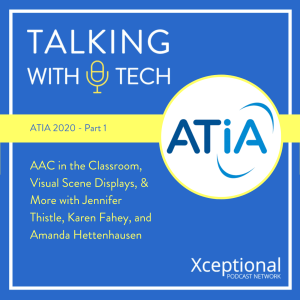
Wednesday Feb 12, 2020
Wednesday Feb 12, 2020
If you love Talking with Tech, help us develop new content and keep the podcast going! Support our podcast at patreon.com/talkingwithtech!
This week on TWT, we present part 1 of Chris’s interviews from the Assistive Technology Industry Association Conference 2020! Before the interviews, Chris shares some stories from ATIA, including not wanting to be “Creepy Chris” when he saw someone he thought he recognized, having FOMO over all the sessions he couldn’t attend, and how much everyone was talking about about literacy at the conference. Chris also talks about the super fun “AT Family Feud” he helped produce!
Interviews this week:
🔑 Jennifer Thistle, Professor at Western Washington specializing in AAC, whose research includes the importance of motor planning and the design of Visual Scene Displays. Visual Scene Displays (VSDs) are photographs with vocabulary embedded into the picture. Jennifer is also asking for feedback from current school-based SLPs who have been working for at least three years and have a student who uses AAC. You can fill out this Google Form and contact her at jennifer.thistle@wwu.edu
🔑 Karen Fahey - graduate student at California State University, Northridge who is interested in AAC & assistive technology. Karen talks about her experience at ATIA, including her favorite parts of the exhibit hall and how much she enjoyed being around other people who are interested in AAC, and also shares about her experiences in grad school.
🔑 Amanda Hettenhausen - SLP & Saltillo consultant talks about how to use AAC in the classroom and adapt books for reading with an AAC user. She shares tips and tricks she uses, including making simple and natural powerpoint books, printing icons on address labels to label books, and more!
Visit bit.ly/twtpod for access to previous episodes, resources, and CEU credits that you can earn for listening to TWT episodes!
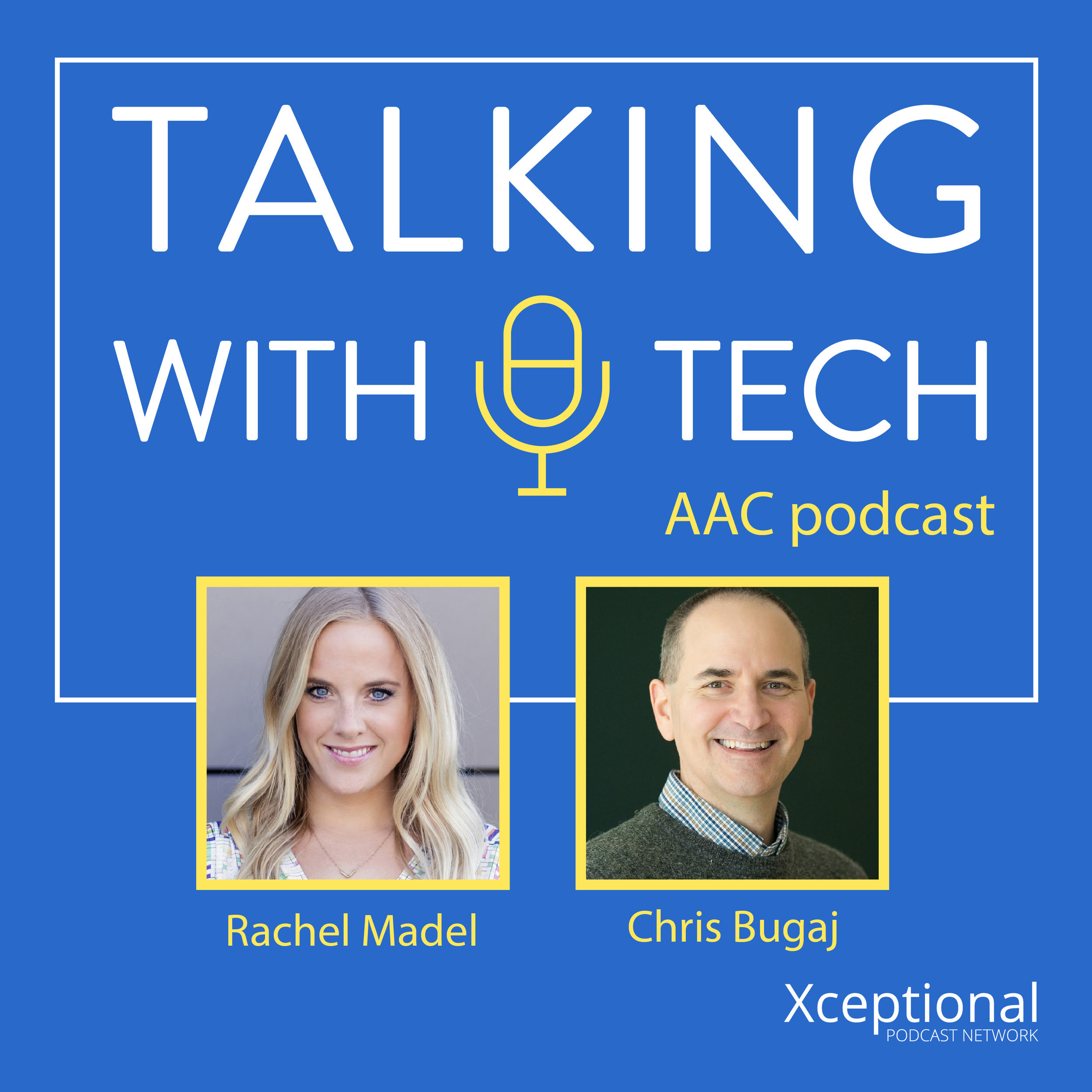
Join AAC experts Rachel Madel and Chris Bugaj as they dive into a weekly discussion about all things AAC (Augmentative and Alternative Communication). Every episode they deliver practical resources, clinical guidelines and relevant research to help clinicians better utilize technology for individuals with complex communication needs.
Episodes include interviews with industry thought-leaders, clinicians, parents, researchers and app developers to keep you on the pulse of the educational technology scene and better support communication through the use of technology.


